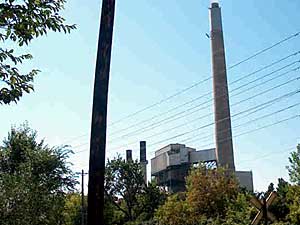|
Photos
Resources
Your Voice
|
Xcel plans to convert to cleaner fuel
September 16, 2003
 |
| Xcel's Riverside plant in Minneapolis is one of three scheduled to be converted from a coal-burning power plant to one that burns cleaner natural gas. (MPR Photo/Brandt Williams) |
Minneapolis, Minn. — Xcel Energy is proposing to convert the Highbridge plant in St. Paul and the Riverside plant in Minneapolis to natural gas. The move would reduce pollutants such as sulfur dioxide, nitrous oxide, mercury and particulate matter anywhere from 97 to 100 percent. A third plant near Stillwater would get upgraded pollution control equipment.
Residents from communities that host the power plants have been pushing for such improvements for years.
Xcel project manager Ron Elsner says the company thinks it's better to do the work now, voluntarily, than to wait for anticipated federal mandates.
"By doing this work now, we can do the work in an orderly fashion. We can do it cost effectively. And the citizens of Minnesota, the residents of the region, are going to be able to enjoy the benefits of those emissions reductions long before they would waiting for a federal mandate," says Elsner.
Neighbors of the Riverside plant in north Minneapolis applauded Xcel's proposal. Activists are rallying residents nearby to make sure they attend the Public Utilities Commission hearings and make their support heard.
Danielle Lake, 17, says she knows lots of people living near the plant who have asthma. She and others, including environmentalists, believe there's a connection between asthma and coal-fired power plant emissions.
Lake says it's important for the commission to approve Xcel's conversion of Riverside.
"A lot of black people now don't really know about what's going on around them. They see the pollution plants, but they're not really knowing how the pollution plants are damaging them and their children, and so forth," says Lake. "I think that we need to let everybody know, get this word around, so this could stop."
Xcel officials call it the most ambitious voluntary reduction plan in the United States.
The Metro Emissions Reduction Project, as it's called, is modeled after conversions Xcel has already taken up in Colorado.
The Minnesota Legislature passed an emissions reduction bill in 2001 allowing any state utility to convert its coal plants to gas. In exchange, the utility can recover the conversion costs by increasing customer rates, without having to go through lengthy rate change hearings with the Utilities commission.
Xcel estimates the cost to ratepayers will increase by approximately $5 to $5.50 per month by the end of the decade.
Xcel says the increase would be incremental and would taper off once the projects were paid off.
Bill Blazar, vice president of the Minnesota Chamber of Commerce, says the business community wants to improve air quality as much as anybody else. But he worries businesses and ratepayers will bear the brunt of the cost increases.
"I think all of the parties understand the challenges on the cost side, and now it's time for all of us to roll up our sleeves, and come up with a way to get this done at the lowest possible price," he says.
Blazar says he doesn't know how Xcel could make its proposal cheaper. A second Xcel proposal before the Public Utlities Commission would cost half as much, but would upgrade the coal-fired plants with pollution controls, instead of converting them to cleaner natural gas.
Xcel is pushing for the natural gas conversion proposal. So is the environmental community, which says the health benefits outweigh the financial costs of the conversions.
The Public Utilities Commission is expected to rule on the Xcel conversion proposals by the end of the year. The proposal has already been approved by the Minnesota Pollution Control Agency.
(MPR's Brandt Williams contributed to this report)
|
News Headlines
|
Related Subjects
|
